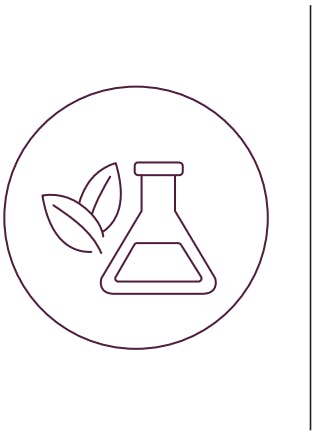By relying on sustainable sourcing for the supply of renewable raw materials, L’Oréal contributes to the social inclusion of vulnerable population groups while ensuring environmentally friendly sourcing.

In 2021, 94% of the biobased ingredients in our formulas were traced and sourced from sustainable sources.

Insurance Net for Smallholders (INES)
Today, four out of five small farmers worldwide have no access to insurance schemes. These small operators and their families are therefore vulnerable to weather events but are excluded from “conventional” healthcare coverage, making them even more vulnerable. In order to reduce this exposure to agricultural and health risks, L’Oréal and AXA, along with the Business for Inclusive Growth (B4IG) incubator, decided in 2020 to develop a micro-insurance project offering tailored health and crop insurance solutions to farmers connected to L’Oréal’s strategic raw materials supply chains.
In 2021, this scheme was rolled out in two L’Oréal supply sectors: the shea butter sector in Burkina Faso and the guar sector in India. The first pilot project aims to provide health and crop insurance to nearly 20,000 shea gatherers who may face health and climate risks. The second pilot project focuses on providing a health micro-insurance solution for all the 2,000 small-scale guar producers who are members of the Sustainable Guar Initiative (SGI), and their families.
The resilience of Guar
Accounting for 80% of global production, India is the world’s leading guar-producing country. Guar grows primarily in Rajasthan, a region characterised by hostile weather conditions and infertile land. Guar is a legume that is used as a powerful thickening agent, mainly in hair care products (shampoos, conditioners, and masks).
Nearly 80% of the population of Rajasthan depends on agriculture, and on guar in particular, as it is one of the few crops that can be grown in this arid region. For these isolated communities, access to a basic social infrastructure such as water and healthcare remains limited: their agricultural production is significantly affected by the monsoon and weather conditions and their income depends on conditions set by the market.
To address these environmental, agronomic and socio‑economic issues, in 2015 L’Oréal partnered with its supplier Solvay and the NGO Techno serve to launch the Sustainable Guar Initiative (SGI). This was aimed at nearly 1,500 farmers, across 13 communities, that are dependent on rain-fed agriculture.
Initially, the project helped structure the sector by establishing a traceable guar supply chain while helping farmers to organise themselves into cooperatives. The farmers were trained in best agricultural practices. In order to guarantee the food security of these communities, the women in the villages were taught the importance of diversity in nutrition and helped in establishing vegetable gardens.
Given the recurring droughts in the region, water is a key issue. A pilot project was therefore launched to develop systems for collecting water so that fields can be irrigated during periods of severe drought, thereby preventing the loss of crops.
In 2020, in order to capitalise on the experience it has gained, strengthen its regional impact and cover 100% of its guar supply, L’Oréal launched a second project in partnership with its supplier Lucid Colloids and the NGO SOL. This project supports 1,200 new farmers in the same region. This project focuses on the following goals: training in ecological farming practices, promoting sustainable water management, strengthening the capacity of women to develop income-generating activities supported by micro-credit, and, finally, supporting the education of farmers’ children.
In 2021, to reinforce the socio-economic resilience of all farmers connected to its supply chain and to combat the high volatility of market prices, L’Oréal set up a minimum price to ensure a fair income for guar producers. Finally, to address health issues, a health micro-insurance solution has been developed with AXA and rolled out to 2,000 guar producers (see the box above on INES).
